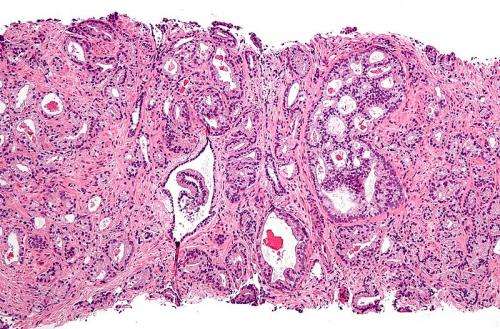Immunotherapy combination generates responses against castration-resistant metastatic prostate cancer

Some patients with metastatic prostate cancer respond to a combination of immune checkpoint inhibitors after hormonal therapy and chemotherapy have failed, according to early results from a clinical trial led by investigators at The University of Texas MD Anderson Cancer Center presented today at the American Society of Clinical Oncology Genitourinary Cancers Symposium in San Francisco.
Principal investigator Padmanee Sharma, M.D., Ph.D., professor of Genitourinary Medical Oncology and Immunology at MD Anderson, said the results of combining the CTLA-4 blocking drug ipilimumab with the PD-1 inhibitor nivolumab provide an encouraging step for a cancer that's been highly resistant to immune checkpoint therapies.
Research by Sharma and 2018 Nobel Laureate Jim Allison, Ph.D., chair of Immunology, leaders of MD Anderson's immunotherapy platform, provided a rationale for combining the two drugs. The platform is part of MD Anderson's Moon Shots Program, a collaborative effort to accelerate the development of scientific discoveries into clinical advances that save patients' lives.
Among castration-resistant patients who had progressed after second-generation hormonal therapy (cohort 1), 25 percent (8 of 32) had their tumors shrink from the immunotherapy combination at a median follow-up of 11.9 months. Among those who progressed after chemotherapy and hormonal therapy (cohort 2) 10 percent (3 of 30) had a response at median follow-up of 13.5 months.
"This was the first combination trial of two immune checkpoint therapies in prostate cancer," Sharma said. "These results support the idea that immune checkpoint blockade can play an important role in the treatment of these patients and provide the foundation to test this strategy in a larger clinical trial."
There were four complete responders, two in each cohort, among the 62 patients who could be evaluated for tumor growth.
Side effects from the combination were consistent with those experienced in previous combination trials for other cancers, with 42 percent of patients in cohort 1 and 53 percent in cohort 2 experiencing grade 3 to 5 adverse events. Among cohort 1, 33 percent had to discontinue participation due to adverse events, with 35.6 percent having to withdraw from cohort 2. The most common adverse events were diarrhea, fatigue, skin rash, nausea and hypothyroidism. Four patients died from treatment-related adverse events, two in each cohort.
Disease progression was the most common reason to leave the trial, with 51.1 percent of cohort 1 and 44.4 percent of cohort 2 discontinuing for that reason.
The researchers also analyzed a number of biomarkers and found that higher tumor mutational burden was associated with response.
Combination heats up cold tumor
In previous clinical trials, neither drug succeeded as single therapy against prostate cancer, a so-called "cold" malignancy because it does not attract the attention of the immune system. Few T cells, the adaptive immune system's targeted warriors, infiltrate prostate tumors.
In a phase I trial, no patients responded to nivolumab alone because the PD-1 inhibitor requires an immune response to be under way in order to attack tumors.
The multi-center combination clinical trial by Bristol-Myers Squibb, maker of both drugs, was organized after research published in Nature Medicine by Sharma and Allison, provided scientific underpinning for the combination in prostate cancer.
Analyzing tumor samples before and after treatment in a clinical trial of ipilimumab and the anti-hormonal drug Lupron, Sharma, Allison and colleagues found that ipilimumab caused an immune response to the cancer reflected by major T cell penetration of tumors.
They also found that PD-L1, a ligand that turns on the PD-1 checkpoint on T cells, was heavily expressed by the tumor and surrounding tissue in response, shutting down the T cell attack. Sharma and Allison hypothesized that combination treatment would induce an immune response with ipilimumab and then protect that response from deactivation by PD-1 with nivolumab.
Sharma said investigators and sponsor Bristol-Myers Squibb are designing a follow-up trial that includes altering either the dosing or scheduling of ipilimumab with the goal of reducing side effects.
Patients in the current trial, CheckMate-650, will be assessed for overall response rate and radiographic progression-free survival as primary endpoints and overall survival as a secondary endpoint.

















